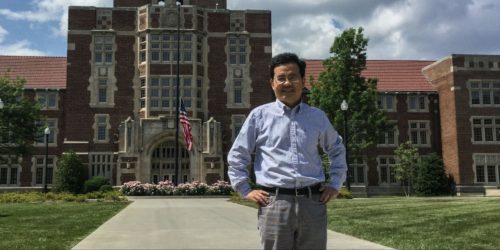Calls to end ‘China Initiative’ intensify after Anming Hu acquittal
"The intentions behind the China Initiative might have served a purpose, but the program that is the China Initiative is a racial profiling witch hunt for theater and show that is ruining careers and turning peoples’ lives upside down."

Calls to abolish the Trump-era China Initiative are escalating following the acquittal earlier this month of Anming Hu, a Canadian scientist at the University of Tennessee who was accused of wire fraud and making false statements.
On Tuesday, the Committee of 100, with attorney and South Texas College of Law Visiting Scholar Andrew Kim, published a study that analyzed 190 court filings from 1996 to 2020 under the Economic Espionage Act (EEA), the act under which espionage-related cases brought forward by the China Initiative would be charged. The research shows that 1 in 4 Asian Americans charged under the EEA were never convicted with a crime. The study also found that since 2009, a majority of people accused of spying were of Asian descent, and that people with Asian names received harsher punishments.
The numbers “give a distorted view of threats to the U.S. economy, both foreign and domestic,” Kim said, adding that “an overzealous rush” to target Chinese espionage in recent years could have led to implicit bias.
The new data is the latest development among growing calls to end the China Initiative — implemented by then-Attorney General Jeff Sessions in November 2018 to address Chinese economic espionage in the U.S. — among lawmakers, academics, lawyers, and activists who say it is fueling racial bias and profiling of Asian-American researchers and faculty. Last week, a group of 177 Stanford University faculty made public a letter asking U.S. Attorney General Merrick Garland to terminate it.
“In recent years, the China Initiative (and some other actions of the federal government) have created an increasingly hostile atmosphere for Chinese Americans, visitors, and immigrants of Chinese origin, which has already discouraged many scholars from coming to or staying in the U.S. This seriously hampers our efforts to recruit the best Chinese students and postdoctoral scholars,” the Stanford letter states.
This summer, 90 other members of Congress signed a letter asking Garland for an investigation into the targeting of people of Asian descent under the initiative, and an update to department-wide implicit bias training.
China news, weekly.
Sign up for The China Project’s weekly newsletter, our free roundup of the most important China stories.
“Chinese Americans are fearful,” said Lucca Wang, English communications director of United Chinese Americans (UCA). Wang says the initiative has only caused increased anxiety at a time when two-thirds of Americans have “cold feelings” toward China, and anti-Asian hate crimes in the U.S. have skyrocketed.
“Chinese professors feel the FBI is doing surveillance on their campuses. They were targeted without cause except that they are Chinese,” Wang said. “The professors are selecting projects or grants to avoid any potential connection with China, which has limited their funding sources or interest.”
The China Initiative emphasizes investigating “non-traditional collectors,” which includes faculty, researchers, and students at academic and research institutions. Critics have said that often, cases brought forward by the initiative have nothing to do with trade secrets, as was the case with Hu and several other cases that have been dropped.
Maggie Lewis, a law professor at Seton Hall University, says the initiative has been problematic from the start; in a Foreign Policy piece in July, she advocated for its termination and argued that naming an initiative after a country was “unprecedented.”
“It’s not the ‘economic espionage initiative,’ or the ‘intellectual property protection initiative,’ it’s the ‘China initiative,’ and they’re bundling within this initiative a lot of different kinds of cases that have some kind of — as they say — ‘nexus,’ some kind of connection to China,” Lewis said in a phone interview.
“If you frame something as a ‘China initiative’…it’s hardly shocking to me that we wake up nearly three years later and go, wow, put under the microscope, people seem to be looked at because of their national origin and or ethnicity,” she added.
According to a Los Angeles Times analysis, out of thousands of investigations, the program has won only four convictions out of 12 prosecutions of people at academic institutions; none of those cases produced evidence of economic espionage or theft of intellectual property. Of cases outside of academic institutions, there were four convictions out of 16 prosecutions involving trade-secret theft and economic espionage.
Hu’s dropped case is not an anomaly under the China Initiative: while it has addressed some real threats to national security, the DOJ dropped five visa fraud cases this summer “in the interest of justice.” Another case against Cleveland Clinic doctor Qing Wang — who the FBI accused of failing to disclose ties to China — was also dismissed without further explanation this summer.
“The program is not effective,” Lucca Wang said. “The intentions behind the China Initiative might have served a purpose, but the program that is the China Initiative is a racial profiling witch hunt for theater and show that is ruining careers and turning peoples’ lives upside down.”
The DOJ has insisted that it takes action based on activity, not ethnicity, and Garland said this summer that it will continue countering Chinese espionage and cyber threats, “but we won’t forget the civil rights and the civil liberties of the people in this country.” The FBI has not responded to FOIA requests from the ACLU and Asian Americans Advancing Justice regarding the initiative.
The Biden administration has given no indication that it would consider terminating the China Initiative.






